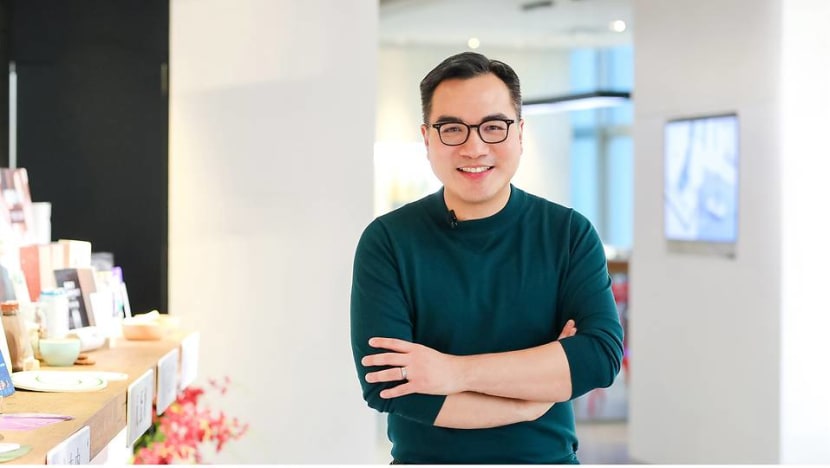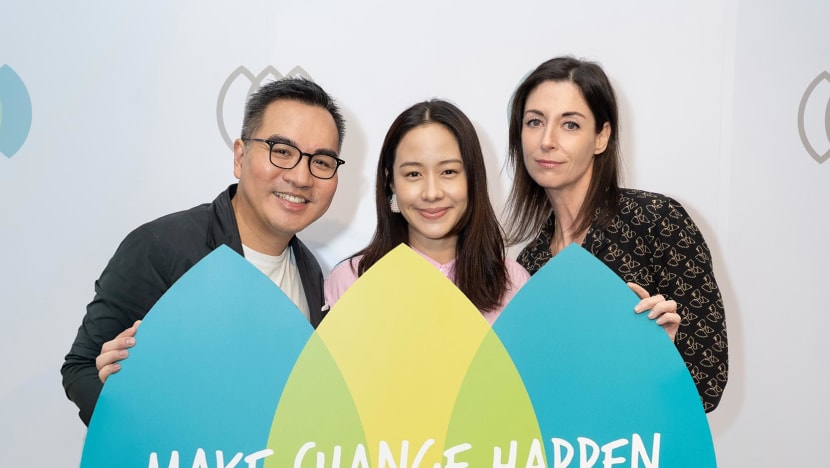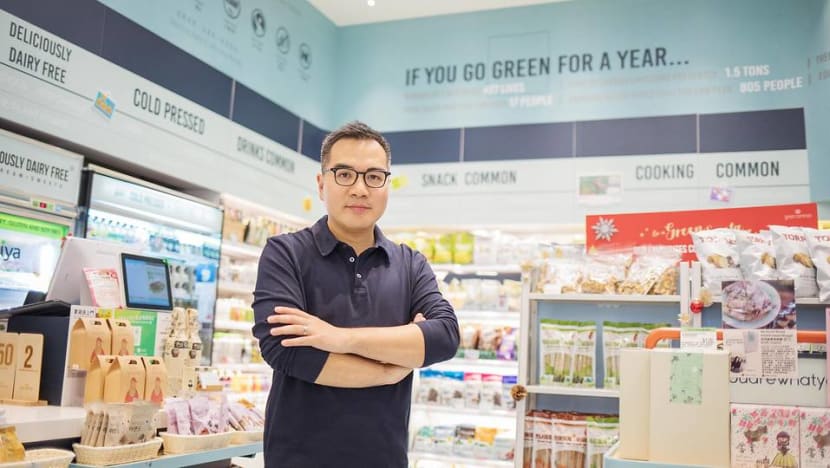This entrepreneur's plant-based business is backed by celebrities like Wang Leehom
David Yeung, the man behind OmniFoods and Green Common in VivoCity, which serves Omni Luncheon Fries and Rendang Chicken Roti, tells CNA Luxury why his plant-based proteins have been well-received in Singapore and his native Hong Kong.

Founded by David Yeung in 2012, Green Monday distributes meat brands such as Beyond Meat, Gardein and its own label OmniFoods, globally. (Photo: Green Monday)
Coined by a marketing professional in the noughties, the meatless Monday campaign advocating once-weekly meat abstinence has been adopted, appropriated and toasted with power juice elixirs worldwide. Paul McCartney released an earnest, albeit cringe-inducing rap ditty endorsing it, as did his charming progeny.
And now, thanks to Hong Kong-based social venture Green Monday, the movement has gained traction in Asia. Founded by David Yeung in 2012, the company distributes meat analogue brands such as Beyond Meat, Gardein and its own label OmniFoods, globally.
It also runs Green Common concept stores featuring cafes – including one that opened in Singapore’s VivoCity in January. In Hong Kong, where Green Monday's efforts to promote plant-based living have been amplified by prominent advocates such as singers Wang Leehom and Vivian Chow – not to mention, McCartney's daughter, Mary – the number of vegans and flexitarians (semi-vegetarians) has risen from 23 per cent in 2014 to 34 per cent in 2020.
Clearly, Green Monday's smoothly articulated campaigns – Yeung's TEDx talks convincingly proselytise the environmental and health benefits of eschewing meat – resonate with celebrities, some of whom he considers friends.
Hearing the entrepreneur deliver a borderline schmaltzy account of Cantopop singer Kay Tse glimpsing hope in an OmniMeat dumpling, it's evident he wields his star connections with panache. But it was a more esoteric concept that prompted him to relinquish his love of luncheon meat more than two decades ago.
“I read something simple about putting ourselves in the shoes of other living things. Ultimately there are karmic forces in the world, and if we don't want to be harmed, we should not inflict harm on other living beings,” he reasoned sagely. The entrepreneur is a Buddhist whose choice of literature includes tomes on Zen tenets.
Epiphany notwithstanding, Yeung waited a month till the Chinese New Year to commit to his cruelty-free lifestyle – symbolising a clean slate that would later become Green Monday's premise. The 44-year-old jocularly says that he can distinctly recall his final non-vegetarian meal, though he won’t share it now, given his newfound designation as animal protector.
“People have known our products for slightly longer in Hong Kong, but the Singapore government has been very proactive in promoting alternative proteins and future foods.” – David Yeung
READ> Meet the restaurateur creating plant-based versions of Singaporean food
WORKING AGAINST THE CLOCK
Beyond his philosophical leanings, the impetus to start Green Monday stems from a United Nations (UN) report cautioning that livestock is responsible for more global warming gases than transportation.
“It was a huge 'aha' moment for me, whereby not eating meat became not just a personal choice but something that would affect the planet and future generations,” shared Yeung. The father-of-two claims to be one of the first in Hong Kong to drive an electric vehicle, and goes for weekend hikes.
While social impact had yet to become a buzz term back then, the engineering graduate – who hails from a family of entrepreneurs – credits his late father for his altruistic bent.
“My dad, who was in real estate and fashion, created a micro-finance fund in 2005, which was very innovative. He didn't even know about Bangladeshi social entrepreneur Muhammad Yunus, who pioneered the concept of micro finance, so I must say he was really ahead of his time,” he shared.
This notion of business rising above selfishness, backed by the senior Yeung's largesse – “he was a huge believer in not leaving a lot to his children” – gave rise to the Green Monday movement in 2012.

The company's vision of combating sweeping issues such as climate change, food insecurity and the public health crisis may sound as lofty as it did when first conceived, but Yeung's brisk manner and “go big or go home” business approach set him apart from the stereotypical ideal-dazzled social entrepreneur groping for the bottom line.
While Green Monday is grounded in advocacy work, the company has grown both in terms of cachet and cash, having raised US$70 million (S$94 million) in September 2020. Green Monday products are now available in more than 20 countries, including Singapore, where they were launched in 2018.
It also boasts a venture arm focused on investing in the “green food” industry, which, notably, participated in a US$3.2 million seed funding round for Singapore cell-based milk producer Turtletree Labs last June.
In a striking validation of his efforts, Yeung was conferred the 2018 Social Entrepreneur of the Year award by World Economic Forum and Schwab Foundation. This preceded his firm being named Company of the Year by PETA Asia in 2019.
“The pandemic has raised people's awareness that we are more fragile than we think, and the planet is very vulnerable. Human beings are so arrogant to think we control everything, which is completely untrue.” – David Yeung
PRACTICAL SUSTAINABILITY
For the savvy advocate, moving the needle involves a sum of moving cogs, or in this case, a gradual reconfiguration of lifestyles.
“I'm always concerned when people talk about sustainability without actual action or change. Yes, of course people need to know that the polar bears are dying and sea levels are rising, but my next question would be, what are you doing? Don't underestimate the baby steps,” he asserted, revealing that his wife is a flexitarian.
In Hong Kong, these “baby steps” have led to the ubiquity of Green Monday's plant-based products, which are offered across McDonald's, 7-Eleven and Tsui Wah outlets.
Yeung draws similarities between his home country and Singapore. Owing to their cosmopolitan natures, he says the two financial hubs are more receptive to plant-based living compared to other parts of Asia.

“People have known our products for slightly longer in Hong Kong, but the Singapore government has been very proactive in promoting alternative proteins and future foods,” he pointed. He further shared that Singapore's flagship Green Common in VivoCity, which serves Omni Luncheon Fries and Rendang Chicken Roti, has been well-received.
Plant-based living seems unlikely to pall in popularity, with the World Economic Forum and Reuters reporting surging demand for plant-based protein in Asia, as COVID-19 sparks concerns over animal-borne diseases. For Green Monday, this is reflected in an uptick in sales, despite store openings being delayed by travel restrictions.
But Yeung favours dogged expansion, with plans to open new outlets in Singapore within the year, among other global product and store launches. While he has a tendency to toss around aspirational terms such as “reengineering food culture” in distilling Green Monday's work, he is emphatic about his case for a carbon-lite lifestyle – which is gaining gravitas.
“The pandemic has raised people's awareness that we are more fragile than we think, and the planet is very vulnerable. Human beings are so arrogant to think we control everything, which is completely untrue,” he opined.
“Ultimately there are karmic forces in the world, and if we don't want to be harmed, we should not inflict harm on other living beings.” – David Yeung












